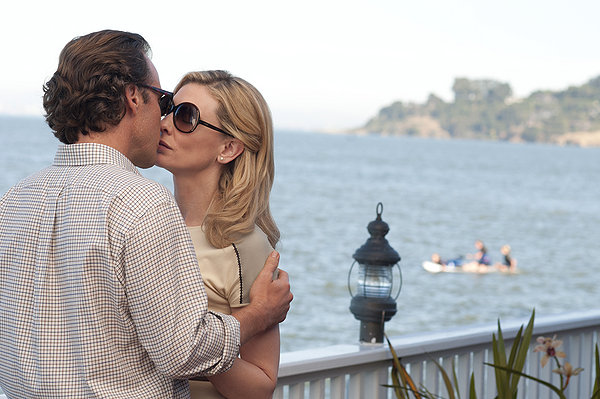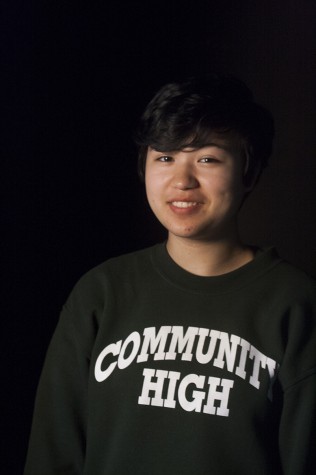Blue Jasmine Movie Review

Courtesy of rottentomatoes.com
October 26, 2013
‘Blue Jasmine’ is a story about Jasmine who is the wife to a wealthy businessman, Hal, and through a series events, loses her wealth, status and marriage. She is forced to move in with her sister, Ginger, who she had previously put second to her lavish lifestyle. Ginger lives in a small apartment in San Francisco with her two kids. Jasmine, unaccustomed to living by modest means, struggles as she attempts to reconstruct her life, failing repeatedly to acclimate.
The story is not told chronologically throughout the film; Jasmine’s back story is revealed through flashbacks, jumping between timelines. The viewer progressively learns throughout the movie about what moves the character, how she has been affected by the circumstances around her and how she copes. The real story is found in what happened previously, more than what is currently happening. The past is all the audience is made to care about and the current timeline only shows how much Jasmine struggles to adjust.
In the first scene Jasmine seems oblivious to social cues, talking the ear off of a woman sitting next to her on a plane, who is polite, but clearly uninterested. Jasmine’s character lacks most of the conventional attributes associated with the typical protagonist: she is vain and despite her problems, she feels very entitled to the lifestyle that she has lost. The audience expects the character to change, shift her moral code, become more down to earth, or at the very least, gain some perspective about her outlook on life. ‘Blue Jasmine’ was unique in the sense that even though the audience clearly recognizes the flaws in Jasmine’s ethics, she fails to become self aware and as her story is revealed, it is still difficult to have sympathy for her, or even try to pardon her perspective.
Throughout the movie, Cate Blanchett portrays Jasmine in wonderfully acted and convincing ways. Jasmine, shaky and sweaty, often pops Xanax in overwhelming situations, drinks obsessively, criticizes Ginger’s life choices and carries herself in a very charismatic but exceedingly vain way. Although Jasmine is difficult to admire, Blanchett’s execution of the character is not.
This film deviates from a typical theme throughout most movies: a hopeful ending and a character changed for the better, becoming someone who is liked by the audience. Jasmine is stagnant in her personal growth. She sees herself as the victim to her circumstances. In some ways, she is a caricature of the rich, because without her status, she is nothing. Not only does she equate her identity with her social and economic status, but the viewer quickly learns that she doesn’t have much substance as a person. Although the audience has some sort of justification in their harsh treatment of Jasmine since she hasn’t had to work a day in her life, there is also a sliver of humanity in the audience as they hope to connect with her character as she struggles with fear and vulnerability. Even so, there is no devotion to the character and instead, Jasmine becomes a series of empty shells and sees herself and the world around her in a very shallow and dehumanizing way. She is a caricature of the rich and snobby, and is nothing without her wealth. She’s the woman who has it all together, and is nothing without her self image and marriage. She’s the undeserving, unable to let go of her sense of entitlement.
Even with the hope of connecting with the protagonist, the audience leaves detached and with an unwanted indifference. Jasmine’s character is on a spiraling route to a trivial life that is doomed to repeat itself. The audience has to watch as her character continues to decline and some might argue, of her own accord.
Secondary characters Ginger, played by Sally Hawkins, her boyfriend Chili, played by Bobby Cannavale, and her ex-husband, played by Andrew Dice Clay, are a bit more relatable. At the beginning, these characters seem sane compared to Jasmine, because their lifestyles are more modest. As the movie progresses, one can’t help but see the patronizing tone this film’s characters were written with; the audience expects and wants to feel sympathetic towards them, but the character depth fails to fulfill these wants. Viewers see Ginger carelessly have an affair with a man she met at a party, only to go back to Chili, her boyfriend, once she discovers the marital status of her lover. Chili is violent, ripping a phone out of the wall, and makes a scene, begging Ginger to come back to him while she is working a day job at a grocery store. There are human aspects to these situations, but it seems to have been written in a way that discredits any validity to the working class. The characters who are more down to earth turn out to be caricatures of a type or class as well.
‘Blue Jasmine’ came out on Aug. 23 2013 and was written and directed by Woody Allen. Cate Blanchett plays Jasmine beautifully as one of the few admirable parts of this movie. Despite the flat plot and unlovable main character, 83% of the viewers who rated it on Rotten Tomatoes liked it and it had a metascore of 78/100.










